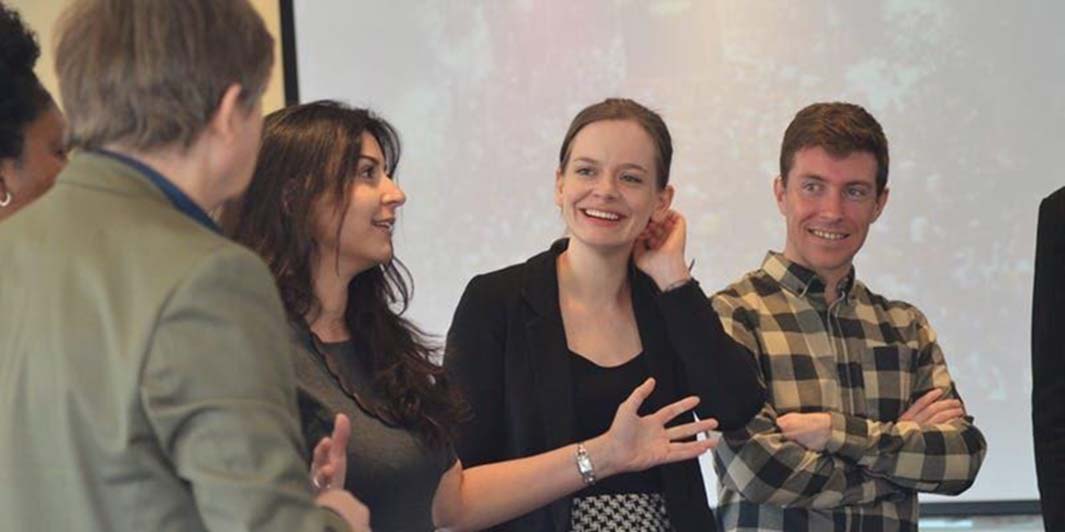With over 1,800 people trained through the National Arts Fundraising School over the past 30 years, the alumni network is an amazing source of advice, guidance and support when you leave the school. As an Alumna myself (and now lead tutor on the School) I’ve experienced this first hand. So when the latest Alumni event invitation arrived I felt an instant sigh of relief at the thought of more stimulating training, reconnecting with other fundraisers, and valuable thinking time away from my desk.

The latest event did not disappoint. Alumni from throughout the years (2002 – 2018) gathered at Shakespeare Schools Foundation HQ where Ruth Brock (CEO of SSF, NAFS Alumna and our host for the event) opened proceedings by sharing her fundraising story. We then moved on to an energetic session from School Director Bernard Ross, learning how to make the most of any networking situation – how to ‘work a room’.
The final part of the afternoon mirrored a session that was run at an Alumni event I attended a few years ago, by my colleague Philly Graham. Participants were asked: what are the greatest challenges you’ve faced since the School? (Read the write-up here.) I thought it would be interesting and useful to see if things had changed: are we still facing the same challenges? Have some challenges grown? Have some gone away?
Many of the challenges shared in Philly’s session came up again – the most prominent of which was….
Time management
Lots of alumni expressed a strain on their time, especially those balancing fundraising and wider responsibilities. Some great tips came from the room, including:
- Commit: set yourself a false deadline by booking in a meeting to discuss that thing you keep putting off. That should get you into gear!
- Synchronise: setting priorities and coordinating work with your boards, committees and line managers can help you to manage expectations and naturally prioritise workloads.
- Dump List: a classic solution that also appeared in Philly’s blog – write down everything you need to do so it isn’t floating in your mind and you can free up space to think about what you need to! Lots of people in the room use the urgent / important matrix as a way of doing this too.
Our advice
- You can find a number of free downloads at managementcentre.co.uk on time management, prioritising etc. A good place to start is with this blog: Use your brain and manage your time
- If you’re looking for training that offers a wealth of techniques to help you use your time more effectively then the one-day Managing Multiple Priorities programme is for you.
Another strong issue was….
Time management of others
Some suggested solutions for that included:
- Put them on the spot: if someone has committed to doing something for you – don’t be afraid to put them on the spot. Even if that’s just to get a clear update on where they are at with it, that will ultimately ease things.
- Visual list: some of the offices have a visual shared deadline board where everyone publicly writes up the things they need to do. This can foster an encouraging and supportive atmosphere to get things done!
- External resource: an excellent suggestion included building in external support to help with project work, especially the evaluation sides which can often drag.
Our advice
- It may sound obvious, but if you’re delegating tasks, make sure you’re clear about what you need to be done, how, and by when. This blog on delegation will help.
- When things still aren’t happening the way you need, feed back to the person about it – but remember that venting your frustration doesn’t motivate anyone, instead try using these effective feedback techniques.

The third challenge Alumni brought up was….
How to get teams involved and give them ownership over fundraising
It’s probably a challenge as old as fundraising itself (!) however its latest term is ‘onboarding’. We discussed this challenge in detail and some of the suggestions included:
- Internal Case for Support: now that we’ve learned how to write a case for support, creating an internal one articulating the financial implications and the change required could help you talk to your board, staff and beneficiaries about fundraising.
- WIIFM: it’s also important to tune into WIIFM (what’s in it for me?) when trying to onboard people. Not everyone needs to know everything inside out – they just need to know the bigger picture, and what their contribution is. Give each person a bit of tailored time and attention.
- Quick wins: what are some of the things you can implement quickly that will evidence your approach? This can be really important leverage for making the bigger case.
- Talk all things supporter: the term supporter is a wider umbrella for donors – but this can also mean audiences, volunteers, ambassadors… this might ease it for people who might not initially be comfortable talking about donations.
- Put those pitching skills to practice: present your work to other teams in your organisation – don’t be shy to explain your value and how it relates to them. People often don’t realise how we do what we do – and are often amazed by it!
- Induct the newbies: ok, so you can’t convert one colleague who has been there for a while and says things like ‘that’s not how we do things here’. But you can catch any new staff joining the organisation – so perhaps it’s worth focusing your efforts on their induction process to onboard them appropriately.
Over the coming years we’ll be working with our NAFS team and Alumni to use these challenges as stimulus for further sharing, session content and future course material.
And that my friends, is the beauty of the network.
Dana Segal
Consultant




